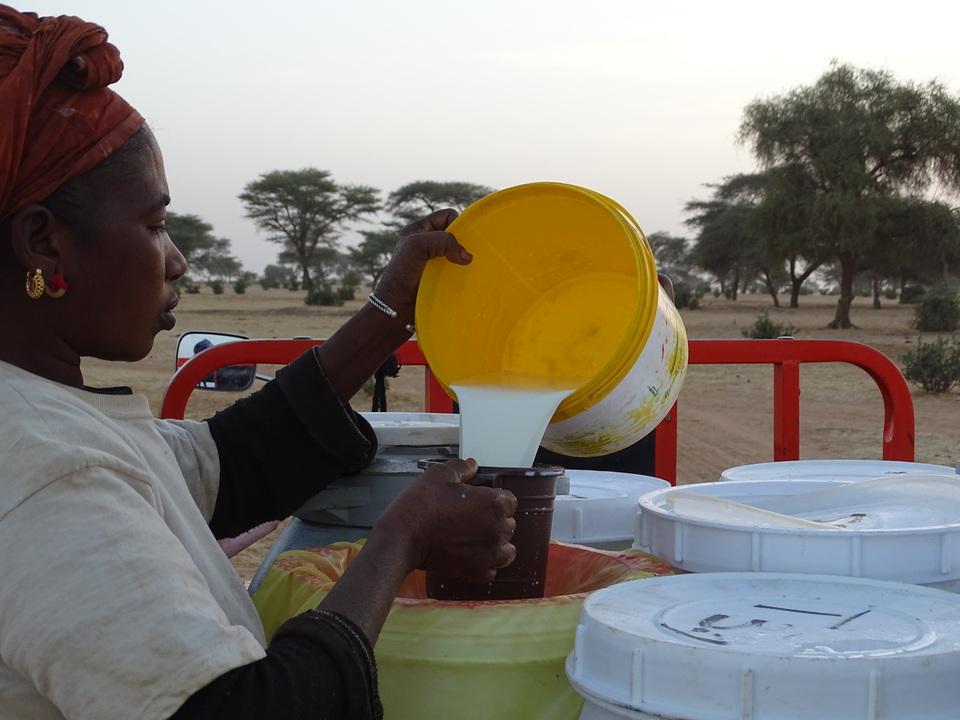Several tens of millions of families in West Africa produce milk. However, as things stand, because of population growth and changing consumption habits, demand for dairy products outstrips local production capacity. Dairies process less than 5% of the milk produced by farms in the Sahel. This is because farms are isolated, output is seasonal and insufficient, and collection systems are inefficient. Local supply chains receive little public support, and have been hard hit by overseas competition in the form of cheap, imported milk powder.
A supply chain drowning in EU surpluses
Since the 2010s, in West Africa, traditional full-fat milk powders have been pushed out by powdered skimmed milk/vegetable fat blends. Butter production leaves makers in Europe with huge volumes of skimmed milk powder. This "by-product" is re-enriched with vegetable fats – often palm oil – and sold in Africa at a price 30% below that of the traditional product. It currently accounts for almost 25% of "dairy product" consumption in the region. It is almost impossible for producers in the Sahel to withstand this unfair competition. Research by CIRAD has shown that traditional dairy products are uncompetitive due to their high cost, the difficulty of transporting them to urban consumers, and the lack of health certification. However, the terms of this competition are also determined by the rules and regulations (or the lack of them) governing quality and trade, which may favour industrial products.
Nevertheless, there is substantial potential to develop local milk collection and processing structures and the jobs, income, and food and nutritional security they would bring. Our work has helped to integrate livestock production into national economies to make it a powerful lever for development in the Sahel, via three main spheres of action.
Supporting local production and collection
Among other things, CIRAD has supported the development of a software to enable farmers to feed their animals with local products; mapping of collection networks; dairy farm monitoring; and simulation of the socioeconomic and environmental impacts of developing mini-dairies. It has participated in the introduction of innovative systems in Senegal, Mali, Mauritania and Burkina Faso, to help stakeholders produce and collect more milk locally. Mini-dairies have proved to have a marked positive impact: they generate substantial income around secondary towns and are an easily reproducible technico-economic model.
Research by CIRAD has also revealed that the most efficient production systems are not large, highly intensive farms but mixed crop-livestock systems based on more rational intensification.
The Laiterie du berger collects 4000 litres of milk locally each day (around 22% of total milk, including milk powder). We turn the raw milk we collect into products with more added value (natural yoghurt, pasteurized milk). The aim is to boost local collection (from 1.3 million litres to 4 million by 2022/2023) and make our dairy a source of both job opportunities and impacts. CIRAD has fine-tuned our awareness of our position within the dairy sector in Senegal and allowed us to work upstream to model the impacts of our development (sociocultural changes within livestock farming communities, and geoclimatic and environmental dynamics). We have worked together to consolidate livestock production systems within our collection zone, by improving and modernizing dairy production models. We are now more capable of promoting local milk thanks to an inclusive, profitable and sustainable business model that contributes to local and national development in terms of jobs, incomes and the circular economy.
Arona Diaw
general secretary of the Laiterie du berger dairy, Senegal
Steering industrial strategy and public policy
On the basis that milk powder imports are crucial for the development of local collection, CIRAD is working with dairy firms and the authorities to include local milk in their respective strategies and policies. CIRAD supports large-scale advocacy campaigns on this topic and supplies civil society players, including NGOs, with the necessary arguments. This has already produced results: firms are increasingly keen to make local collection the core of a sustainable, profitable long-term strategy. Our research has also shown policymakers the merits of modifying legislation and tax measures to foster the development of the local sector. With the introduction of a minimum quota for locally collected milk, VAT exemptions for certain local products, targeted taxation of palm oil-enriched powder-based products, and so on, governments in the Sahel are increasingly showing their commitment. Lastly, CIRAD is working actively to set up local consultation bodies (World Milk Days and local observatories) to encourage stakeholders to discuss the issues. The launch of a local milk campaign by the Economic Community of West African States (ECOWAS) is the most significant result so far.
Thanks to CIRAD, we understood that there would not be a dairy industry in the Sahel without powdered milk imports. And no industry would mean no local collection. The knowledge generated by research has enabled players (milk producers, animal feed producers, African and European dairy firms, consumers and regional institutions) to change how they see themselves, overcome past inertia and blockages and identify opportunities for collaboration. There are people talking now who would never have agreed to sit down together a few years ago. We have organized almost ten meetings in the past five years to encourage players to come up with new visions centring on how things could be done differently. This dialogue, which is key, hinges on the ability of researchers to calm the debate and put science back at the centre of any exchanges. In this respect, CIRAD, which bases its research on hypotheses, is the very model of a development-oriented research organization.
Serge Aubague
technical adviser on CARE Denmark pastoral programmes in the Sahel
Training dairy sector managers
By supervising a series of theses on the dairy sector in the Sahel and establishing training courses, CIRAD is helping to build a valuable body of knowledge and supporting dairy sector leaders. Many ex-PhD students who were co-supervised by CIRAD are now working for agricultural research organizations in West Africa, international public development aid agencies (World Bank, USAID, etc.) and the authorities.
What remains to be done? One of the priorities for our current research is to work alongside African and European dairy firms to promote “responsible” investment and exports in West Africa. To this end, in December 2020, CIRAD presented a study of the environmental and socioeconomic impacts of European powdered milk exports to West Africa to European parliament members. This work with the private sector complements our background work of supporting public policy, farmers’ organizations and development agencies. Our support of this sector, which is of key importance for the West African economies of the future, is thus growing year after year.


























.jpg)
